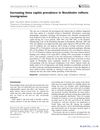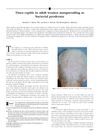 155 citations,
June 2009 in “International Journal of Dermatology”
155 citations,
June 2009 in “International Journal of Dermatology” Lichen planus is a skin condition that can resolve on its own, is linked to hepatitis C, and increases the risk of skin cancer.
 121 citations,
April 2008 in “The Journal of Clinical Endocrinology & Metabolism”
121 citations,
April 2008 in “The Journal of Clinical Endocrinology & Metabolism” Insulin sensitizers may slightly reduce hirsutism but are less effective than other treatments.
[object Object]  118 citations,
September 2004 in “Clinics in Dermatology”
118 citations,
September 2004 in “Clinics in Dermatology” Hormones, especially androgens, play a big role in acne, but most acne sufferers don't have a hormone disorder. Hormonal treatments, including birth control pills, can be very effective for women whose acne doesn't improve with regular treatments.
 117 citations,
May 2017 in “Human Reproduction Update”
117 citations,
May 2017 in “Human Reproduction Update” The update highlights that non-classic congenital adrenal hyperplasia is common in women with excess male hormones, requires specific hormone tests for diagnosis, and has various treatment options depending on age and symptoms.
 112 citations,
July 2008 in “Dermatologic Therapy”
112 citations,
July 2008 in “Dermatologic Therapy” Folliculitis decalvans is a rare scalp condition causing scarring hair loss, treated with long-term antibiotics and other medications, but it often comes back and is hard to manage.
 105 citations,
February 2017 in “British Journal of Dermatology”
105 citations,
February 2017 in “British Journal of Dermatology” Survivors of Stevens-Johnson syndrome/toxic epidermal necrolysis need ongoing care for various long-term health problems.
 88 citations,
June 2009 in “Cleveland Clinic Journal of Medicine”
88 citations,
June 2009 in “Cleveland Clinic Journal of Medicine” To manage diffuse hair loss, identify the cause, improve nutrition, remove triggers, and use specific treatments like minoxidil or finasteride.
 85 citations,
June 2008 in “Annals of the New York Academy of Sciences”
85 citations,
June 2008 in “Annals of the New York Academy of Sciences” PCOS starts in adolescence with hormonal issues, leading to adult health problems, and early treatment is crucial.
 78 citations,
November 2008 in “Fertility and Sterility”
78 citations,
November 2008 in “Fertility and Sterility” Amenorrhea is relatively rare and initial testing should check FSH, TSH, and prolactin levels.
 76 citations,
November 2009 in “Medical Clinics of North America”
76 citations,
November 2009 in “Medical Clinics of North America” Hormones, especially androgens, play a key role in acne, which can be a symptom of systemic diseases like PCOS and may require targeted treatment.
 64 citations,
January 1998 in “Drugs”
64 citations,
January 1998 in “Drugs” Dienogest combined with ethinylestradiol is a highly effective birth control that improves menstrual symptoms and has manageable side effects.
 63 citations,
March 2016 in “International Journal of Molecular Sciences”
63 citations,
March 2016 in “International Journal of Molecular Sciences” Children with atopic dermatitis often have sleep problems due to itching and may benefit from melatonin, which helps with sleep and skin symptoms.
 61 citations,
January 2017 in “Human Reproduction Open”
61 citations,
January 2017 in “Human Reproduction Open” The review recommends hormone replacement therapy for women with premature ovarian insufficiency to manage symptoms and protect health, with specific approaches for different groups.
 54 citations,
June 2015 in “Australasian Journal of Dermatology”
54 citations,
June 2015 in “Australasian Journal of Dermatology” Spironolactone is an effective and well-tolerated first-line treatment for hidradenitis suppurativa in women.
 52 citations,
January 2004 in “Medical mycology”
52 citations,
January 2004 in “Medical mycology” The rise in tinea capitis cases in Stockholm is linked to increased African immigration.
 51 citations,
January 2014 in “Pediatric Clinics of North America”
51 citations,
January 2014 in “Pediatric Clinics of North America” The guide explains how to identify and treat children's hair loss, including fungal infections, autoimmune disorders, hairstyle changes, self-correcting conditions, and behavioral therapy for hair-pulling.
 44 citations,
June 1985 in “Fertility and sterility”
44 citations,
June 1985 in “Fertility and sterility” Combination drug therapy is effective for hirsutism that doesn't improve with just one medication.
 42 citations,
September 2018 in “Journal der Deutschen Dermatologischen Gesellschaft”
42 citations,
September 2018 in “Journal der Deutschen Dermatologischen Gesellschaft” Adult female acne requires a comprehensive treatment approach, including medical options and lifestyle changes, with attention to psychological well-being.
 41 citations,
June 2010 in “Clinics in Dermatology”
41 citations,
June 2010 in “Clinics in Dermatology” Smoking harms skin health, causing slower wound healing, more wrinkles, and worsening some skin conditions, but may protect against certain others.
 39 citations,
May 2011 in “European Journal of Clinical Investigation”
39 citations,
May 2011 in “European Journal of Clinical Investigation” Hirsutism can be caused by various conditions besides PCOS, and it's important to treat the underlying issue and manage symptoms with medication and cosmetic approaches.
 37 citations,
April 2019 in “Journal of The American Academy of Dermatology”
37 citations,
April 2019 in “Journal of The American Academy of Dermatology” Some treatments like intralesional steroids and 5α-reductase inhibitors are effective for frontal fibrosing alopecia, but more research is needed.
 36 citations,
January 2012 in “International Journal of Trichology”
36 citations,
January 2012 in “International Journal of Trichology” Losing eyelashes or eyebrows can be a sign of many different health problems and needs a careful approach to treat effectively.
 36 citations,
April 1990 in “Dermatologic Clinics”
36 citations,
April 1990 in “Dermatologic Clinics” Most pregnant women experience skin changes like darkening and stretch marks, and some may have skin conditions that usually get better after giving birth.
[object Object]  35 citations,
January 2006 in “Journal of Dermatological Treatment”
35 citations,
January 2006 in “Journal of Dermatological Treatment” Zinc can help with some skin problems, but its effectiveness varies depending on the condition.
 34 citations,
January 2011 in “Fundamental & Clinical Pharmacology”
34 citations,
January 2011 in “Fundamental & Clinical Pharmacology” New treatments for PCOS show promise, but no current medication treats all aspects of the condition.
 34 citations,
April 2009 in “Expert Opinion on Pharmacotherapy”
34 citations,
April 2009 in “Expert Opinion on Pharmacotherapy” Some treatments work for common baldness, but there's less evidence for other hair loss types, and more research is needed.
 33 citations,
September 2008 in “Dermatologic therapy”
33 citations,
September 2008 in “Dermatologic therapy” Doctors should know how to diagnose and treat PCOS, which often involves checking for high male hormone levels and using medications to manage symptoms.
 32 citations,
August 2003 in “Journal of the American Academy of Dermatology”
32 citations,
August 2003 in “Journal of the American Academy of Dermatology” Tinea capitis can be misdiagnosed as bacterial infection in adult women but is treatable with antifungal medication.
 32 citations,
November 1996 in “International Journal of Dermatology”
32 citations,
November 1996 in “International Journal of Dermatology” Antiandrogens can help treat skin conditions like acne and excessive hair in women when used carefully.
 30 citations,
June 2019 in “Frontiers in Endocrinology”
30 citations,
June 2019 in “Frontiers in Endocrinology” The document concludes that managing non-classical congenital adrenal hyperplasia in females requires personalized treatment, genetic counseling, and a team of specialists.






























